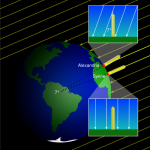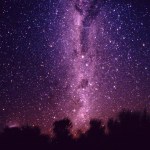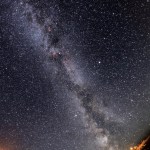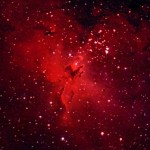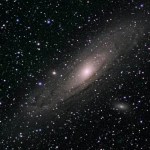Stars
We have a treat for you this week: Starts With A Bang gets to host this week's Carnival of Space! We take the best space and astronomy posts from around the internet and pull them together in one great extravaganza! I've gotten to host twice before, and this is a very special edition for astronomers. Why, you ask?
Yesterday was the Summer Solstice! Longest day of the year (for us Northern Hemisphere folk), most sunlight, the Sun gets highest in the sky, and shadows are the shortest. If you want to go all the way back, this was the day that allowed us to discover the Earth was round! Let's…
Amazing is an understatement when it comes to how much we've learned about our Universe in the last century. 90 years ago we confirmed general relativity, and got a whole new theory of gravity as a result. But, we still thought our Milky Way was the only galaxy in the Universe.
There were a few types of weird objects we knew of in great detail, such as the original 103 Messier objects. There were weird, spherical clusters of stars, like M2:
There were planetary nebulae, known to be the afterglows of dying or exploding stars, such as M27:
And then there were the much-debated "spiral nebulae…
Just a short while ago, I showed you how the most powerful telescopes were able to gather incredible amounts of light from a tiny part of the sky, and peer deeper into the darkest regions of the Universe than ever before. But there's another way to do astronomy that's just as majestic: view the entire sky at once.
For an astronomer, this is easy; all you have to do is get a fisheye lens, and you can see an entire hemisphere with no problem. (The "up" hemisphere is much more interesting than the "down" one.) If you use it at night and take a time-lapse exposure, you can truly create some…
There are very few sources of truly clean energy out there. Coal, oil, natural gas, etc. all expel tremendous amounts of carbon dioxide into the atmosphere, something we know we need to stop doing very soon if we want our planet to be habitable to humans for very much longer. Biofuels, while not as harmful as fossil fuels, still emit tremendous amounts of carbon dioxide, and are not a long-term solution. Modern nuclear power produces low amounts of carbon dioxide, but significant amounts of radioactive waste, which isn't good for anybody! Even hydroelectric power has disastrous environmental…
It is done! The longest-running and most famous camera in the world, Hubble's WFPC2, has been removed and replaced. Scientists will now get to use the Wide-Field Camera 3 (below), and WFPC2 is headed to the Smithsonian.
You've already gotten a chance to taste what WFPC2 has done for our understanding of the Universe, Planets, Galaxies, and Clusters of Galaxies in the first four parts of our series on The Camera that Changed the Universe. What else is left?
Part FiveWell, the only thing I didn't cover yet is stars. And yet, perhaps no other tool -- ever -- has been more useful for discovering…
There's a new scientific paper online today about a very special and rare type of star: an ultracompact X-ray binary star. (One of the authors is surnamed Maccarone.) Let's start by explaining what these things are, how they work, talk about this one in particular, and what it all means. You've heard of binary stars before; these are systems where, instead of having one fusion-burning star in it (like ours), there are two. It turns out that most star system in our galaxy are binaries. If Jupiter were about 70 times more massive, we'd be living in a binary star system ourselves.
Well, let's…
Light is an ephemeral but powerful artistic medium. This commercial for the Belgian energy company Electrabel captures the whimsical charm of fireflies on a warm summer night:
You can view a stunning higher-res version of this video here, with slightly different music. There is also a making-of video with scenes of the film shoot.
Thanks to Rhett for finding this one!
Good news for science from... the Vatican? No joke. Father Gabriel Funes, director of the Vatican Observatory and chief astronomer for the Pope, has just issued a public statement stating the following things:
Intelligent beings could exist in outer space.
Life on Mars cannot be ruled out.
The search for extraterrestrial life does not contradict belief in God.
Next year, the Vatican is organizing a conference to mark the 200th anniversary of the birth of Charles Darwin.
Whoa. And whoa's wobbly cousin, woah. Did I just step into the 21st century? After my post last week on what Americans…
What is the future of this website? I'm going to be creating videos for the web about the Universe. I'll be answering questions ranging from what the Universe is like today to how it got to be that way. I'm going to address every step that we know of, from the Big Bang up to the present day.
And I'm going to do it naturally, by telling the story as the Universe tells it directly to us. I call this project Genesis. Check out the teaser trailer below, and tell your friends, because this is coming in January.
What's going to happen to all the stars in the Universe as they get older? Well, just as nothing can live forever, stars can't live forever also. Why? Because they run on fuel: burning hydrogen into helium, for example. When they run out of fuel, something's gotta give. Barbara Ryden reminds us of an excellent and appropriate quote by Dylan Thomas:
Do not go gentle into that good night.
Rage, rage against the dying of the light.
But what exactly happens to the star depends very sensitively on what the mass of the star is.
If you've got a tiny little star, less than about 40% of the mass of…
Last week, Jamie (my significant other) came home from work and told me about a conversation she had with her coworker, Chris. This week she asked another one, Miguel, whether he had any questions about Astronomy, Physics, space, etc. This week's question comes from Miguel:
What is a galaxy, anyway? Why does it look like a big bright fuzzy star? And why are there different types of galaxies; shouldn't they all be the same?
This might come as a surprise, but 100 years ago, it was pretty much accepted that we were the only galaxy in the Universe. In fact, there was a great debate in 1920 on…
